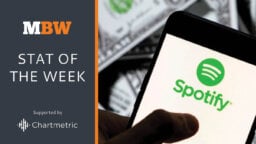
I have to agree wholeheartedly with James Sandom. It’s good to see that at least some media commentators in the industry are reporting on this issue sensibly.
The furore over freemium seems strikingly familiar, energised by a patina of the industry that is utterly subjective and completely ignoring (at best) or manipulating and misreporting the statistics.
We only have to go back to the Napster era, when the RIAA was busy trying to take down digital altogether, with people at all levels of the industry arguing for making the digital dissemination of copyrighted material completely illegal.
“We only have to go back to the napster era, when the RIAA was busy trying to take down digital altogether, for another exmaple of the industry completely ignoring the statistics.”
And then came iTunes, showing the industry how to actually make some money from it. Of course, all along, there were voices in the industry trying to argue that digital was, if not a “good” thing, then an inevitable development.
I think the primary factor here is that none of the streaming naysayers ever considers who the consumer actually is. I believe there can be no argument that the future of music consumption is not on-demand digital. So the key thing is for everyone to stop fighting over the particulars of the status as it is now, and how it affects past models, and concentrate on how we move to the point where the majority of music consumption is streaming.
Notice a slight move away from Lucian Grange’s voicing of the situation.
“Spotify’s model is totally dependent on developing an ever-increasing pool of music consumers. Up until now they’ve been doing a great job.”
I don’t thing this is a case of whether or not freemium can support the industry, but whether freemium is an essential part of the development of a paying customer model that will support the industry.
More objectively put, it’s about how any industry responds to unavoidable disruption of its core business models. Over the last twenty years or more, the industry as a whole as displayed abject incapability to develop and restructure from within, allowing technology companies to use and abuse music as a means to an altogether different end.
And we now find ourselves in the utterly laughable position that the “mighty” Universal is attempting to fight the might of the technology giants over the future of music delivery, whilst publicly sniping at the only relevant music delivery company that actually has no other motive other than to deliver music to fans.
Spotify‘s model is totally dependent on developing an ever-increasing pool of music consumers, a percentage of which will end up as premium subscribers. I agree with James that up to now they’ve been doing great job.
And just imagine how much better that 25% premium figure might be if the industry were to actually throw its weight behind Spotify rather than trying to torpedo them at every step.
“Just imagine how much better Spotify’s 25% premium figure might be if the industry actually threw its weight behind them, rather than trying to torpedo them.”
I fear that if the industry leaders carry on the way they are going, with threats to Spotify’s model via uneconomical licensing agreements, then the sleeping giant will roll over and crush Spotify altogether.
Apple are not a music company.
Anyone who thinks Apple care a damn about music is sorely mistaken. Music is just something that makes them look cool.
They want to control it; not so they can control the music industry, but so they can use it as one more tool to sell their products.
The industry allowed supermarkets to downgrade physical music to a throwaway loss-leader product.
Now it’s doing the same with streaming.
Emily Barker’s new album, The Toerag Sessions, is being released in conjunction with PledgeMusic. Read all about it through here.Music Business Worldwide





